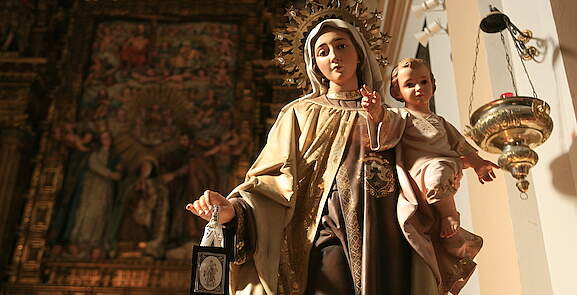
The Magnificat is both Mary’s hymn and a hymn of God's humble people.
In the first verses, Mary speaks of herself, of her joy, humility and happiness, which would be proclaimed in the Church by all future generations, until the end of time; then she gathers around her, as it were, all those who worship the Lord and who are also the object of His Mercy.
The same God, whose name is holy, did great things for Mary and performed a "mighty deed" by His arm for the humble people. Mary does not separate what God did for her from what He did for all the descendants of Abraham, those who live by faith. For she sees herself as a member of the people of the Covenant. She is a servant, a member of God’s servant Israel, and what God has done through her is Mercy for all those who hunger for light and life.
Mary’s reflex to fade into the sanctified people is for us, in consecrated life, rich with meaning.
If, on a call from Jesus, we have chosen a destiny of humility and service; if we prayerfully keep watch for the moment when God will cast his eyes on us; if we offer ourselves—in our state of poverty—to the fire of the Spirit; and if we enter courageously "under His shadow," it is on behalf of all those who seek God and for the peace of all those whom God loves. The great things that God does for us in secret, that only He can see and do, are intended for the happiness of all, for the holiness of the entire Church, and for the salvation of the entire world.
The place where the Lord has put us—namely the monastery where we pronounced our vows—may well surprise us at times by its mixture of greatness and limitations, of fidelity and misery. But it too is inhabited by a vocation to the universal, and this universal responsibility is for each monastery the antidote to all sadness and all withdrawal from reality, because "the world is on fire" (Teresa of Avila) and our time to love is running out.
Like Mary’s exultation, the Carmelite monastery is at the heart of the Church, at the heart of the world in need of salvation. Like Mary, the Carmelite Sisters carry in their prayer all the hope of the people of the "yes." Like Mary who proclaims to be "blessed," each Carmelite sister welcomes the great things that God continually does in her, through His Mercy for the world that He loves, with humility.
From Mary, the Carmelite community learns compassion. In Nazareth, the Carmelite community learns the language of the Cross and universal prayer.
Father Jean Lévêque, O. Carm., Province of Paris